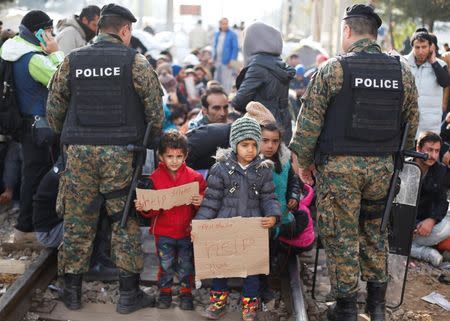U.N. decries Balkans border curbs on refugees; arrivals in Greece fall
By Stephanie Nebehay GENEVA (Reuters) - The United Nations on Tuesday condemned new restrictions on refugees that have left around 1,000 migrants stuck at the main border crossing into Macedonia from Greece, denied entry due to their nationalities in violation of international law. "Profiling asylum seekers on the basis of their alleged nationality infringes the human right of all people to seek asylum, irrespective of their nationality and to have their individual cases heard," U.N. chief Ban Ki-moon said in a statement issued by his press office. He urged nations to "respond with compassion, solidarity and shared responsibility." Balkan countries have clamped down at their borders recently to stem what has been an anarchic, largely unchecked stream of humanity into Europe this year. But there were signs on Tuesday that the tide was starting to ebb somewhat - although relief officials cautioned that it was too early to declare a trend. "Talk about a sharp drop in the number of refugee arrivals to Greece may be premature. UNHCR staff on Lesbos (island) report that over 40 dinghies carrying an estimated 2,000 refugees and migrants arrived last night (Monday) and today," U.N. refugee agency spokesman William Spindler told Reuters. The International Organization for Migration (IOM) reported earlier that the number of refugees and migrants reaching Greek islands, the most common entry point to Europe, fell to 155 on Sunday while 478 arrived at the ports of Athens and Kavala - far fewer than the daily average for the past few months. "The drop is significant given that, according to IOM estimates, some 100,000 migrants have crossed into Greece since the beginning of November – averaging around 4,500 crossings per day," an IOM statement said. There have also been no migrant boats landing in Italy, the other main gateway into Europe, since Nov. 19, it added. Increasingly stormy winter weather is making crossings by sea to Europe more dangerous, and refugees trekking northwards through the Balkans are now exposed to freezing cold and snow. Traditional refugee haven Sweden announced it will tighten border controls and asylum rules to stem the flood of asylum seekers into the Nordic country and force other EU nations to accept a bigger share of refugees. A popular backlash against refugees is intensifying in the country that has taken in the majority of asylum seekers - Germany, while it has become harder to cross borders along the main Balkan corridor toward Western Europe. Macedonia's refusal to admit 1,000 migrants was part of a new policy by Balkan states to filter the flow by granting passage onwards towards western Europe only to those fleeing conflict in Syria, Iraq and Afghanistan, who are seen as genuine asylum seekers rather than "economic migrants". U.N. officials said the new, uncoordinated obstacles that have stranded migrants on several frontiers in the Balkans threatened a "new humanitarian situation" that required urgent attention given the onset of winter. "The new restrictions chiefly involve people being profiled on the basis of their claimed nationalities," UNHCR spokesman Adrian Edwards told a news briefing in Geneva. BLOCKED MIGRANTS ON HUNGER STRIKE Nationals of countries other than Syria, Iraq and Afghanistan are being stopped, leading to protests by about 200 people, mainly Iranians, Bangladeshis and Pakistanis, with about 60 now on hunger strike, Edwards said. "All people have the right to seek asylum, irrespective of their nationality and to have their individual cases heard. Proper information needs to be provided to people affected by decisions at border points, and proper counselling needs to be available," he said. About 30 people are marooned at Macedonia's northern border with Serbia, mostly Nigerians and Moroccans, Spindler said. UNHCR had no information on whether the border curbs were linked to security fears over reports that one of the Islamic State militants who attacked Paris on Nov. 13, killing 130 people, may have entered Europe posing as a migrant. "Nonetheless, the environment has significantly worsened for people seeking asylum and that's a very major concern," Edwards said. There have been no migrant deaths reported in Greek-Turkish waters since Nov. 17, "so we're hoping this is showing a trend where things are starting to fall off with the winter," IOM spokesman Joel Millman said. "There has been no landing in Italy since the 19th of November. We don't believe that this many days have gone by without an arrival in almost two years, so that's kind of significant." Millman also cautioned against jumping to conclusions. He cited Turkish Coast Guard exercises as another possible reason for the sharp drop in migrants leaving the country for Greece. "Although we do note a sharp decrease, we're wondering if it's going to start ticking up again," he said. About 858,805 refugees and migrants from the Middle East, Africa and Asia have arrived in Europe so far this year by sea, while 3,548 have died or gone missing, according to IOM figures. Only 148 refugees have been relocated from Italy and Greece to other EU countries under a plan for transferring 160,000 agreed by EU leaders in September, Edwards said. (Additional reporting by Tom Miles in Geneva and Louis Charbonneau in New York; Editing by Mark Heinrich and Dan Grebler)

 Yahoo News
Yahoo News 

